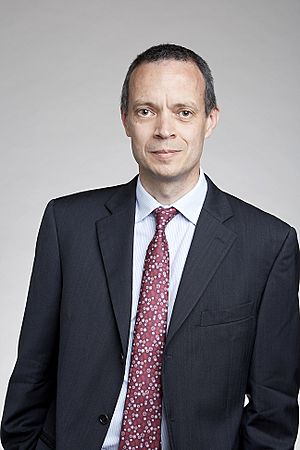Andrew Orr-Ewing facts for kids
Quick facts for kids
Andrew Orr-Ewing
FRS FRSC MAE
|
|
|---|---|

Orr-Ewing in 2017
|
|
| Born |
Andrew John Orr-Ewing
1965 (age 60–61) |
| Education | Dr Challoner's Grammar School |
| Alma mater | University of Oxford (MA, DPhil) |
| Awards |
|
| Scientific career | |
| Fields | Physical chemistry Chemical physics |
| Institutions | University of Bristol Stanford University |
| Thesis | Laser studies of reaction dynamics (1991) |
| Doctoral advisor | Gus Hancock |
Andrew John Orr-Ewing, born in 1965, is a British scientist. He is a professor of physical chemistry at the University of Bristol. His work helps us understand how chemical reactions happen. He studies these reactions in both gases and liquids. Professor Orr-Ewing uses special lasers to see how molecules react. He also looks at how liquids affect these reactions.
Contents
Education and Early Career
Andrew Orr-Ewing went to Dr Challoner's Grammar School. He then studied at Jesus College, Oxford. He earned his first degree from the University of Oxford in 1988. In 1991, he completed his PhD. This is a higher degree in physical chemistry. His research was guided by Gus Hancock at Oxford.
Post-Doctoral Research
After his PhD, Professor Orr-Ewing moved to California. He spent two years doing post-doctoral research at Stanford University. He worked with a famous scientist named Richard Zare. This research helped him gain more experience.
Becoming a Professor
After Stanford, he returned to the UK. He became a research fellow at the University of Bristol. A research fellow is a scientist who focuses on research. In August 2004, he became a full Professor of physical chemistry at the University of Bristol. His main interests are in physical chemistry and chemical physics. These fields study how matter behaves and changes.
Awards and Achievements
Professor Orr-Ewing has received many important awards. These awards recognize his excellent work in chemistry.
Key Awards
He has received several awards from the Royal Society of Chemistry. These include the Edward Harrison Memorial Prize in 1994. He also won the Marlow Medal in 1999. In 2009, he was awarded the Tilden Prize. He also received awards for his work in optical spectroscopy in 2002. In 2014, he was recognized for his work in chemical dynamics.
Other Honours
In 2005, he was a senior research fellow for the Leverhulme Trust. This is a special award for experienced researchers. In 2006, he received a Royal Society Wolfson Research Merit Award. This award supports top scientists. In 2017, he was elected a Fellow of the Royal Society. This is a very high honour for scientists in the UK. In 2018, he became a Member of the Academiae Europaea (MAE). This is an academy for leading scholars in Europe.

